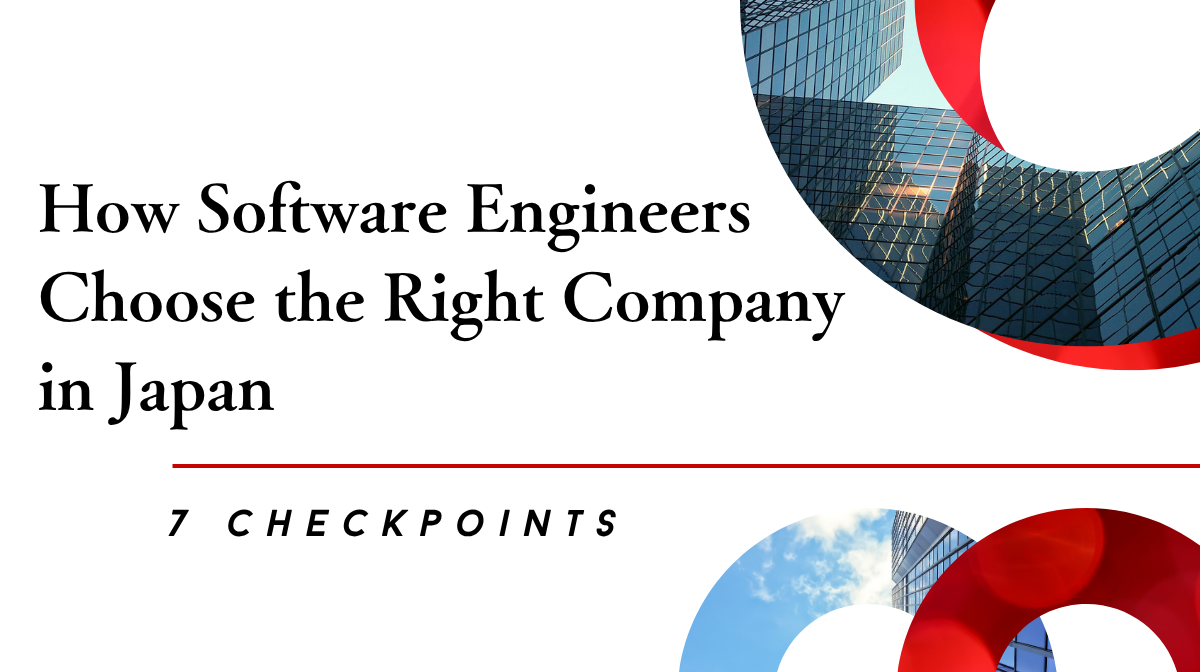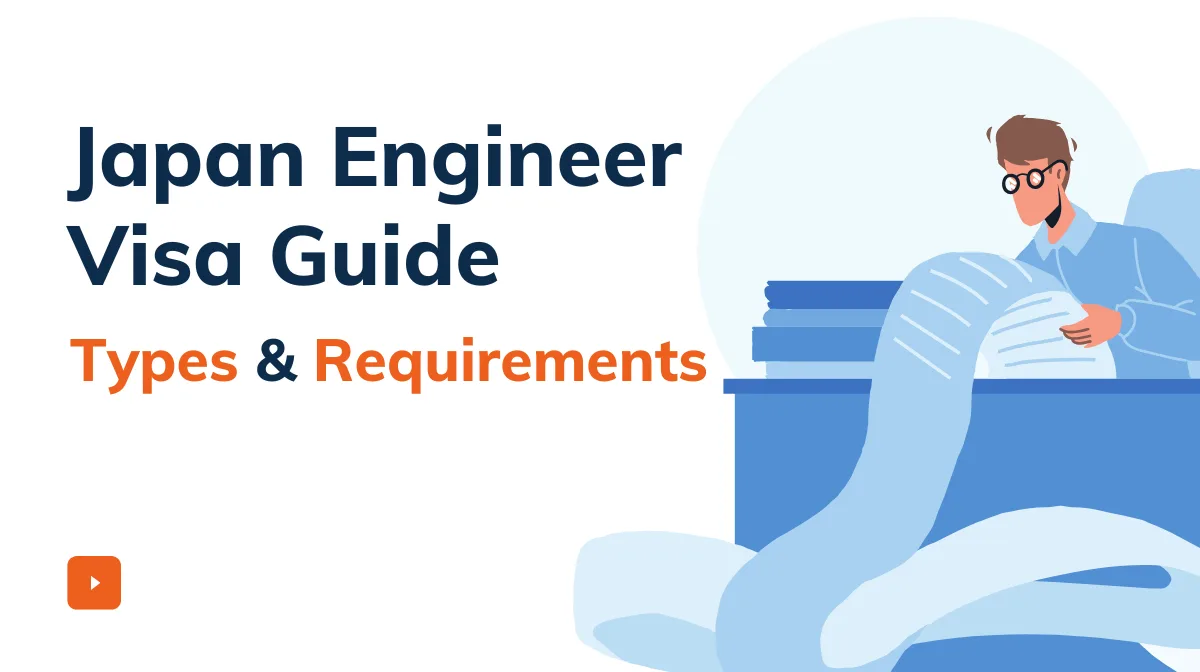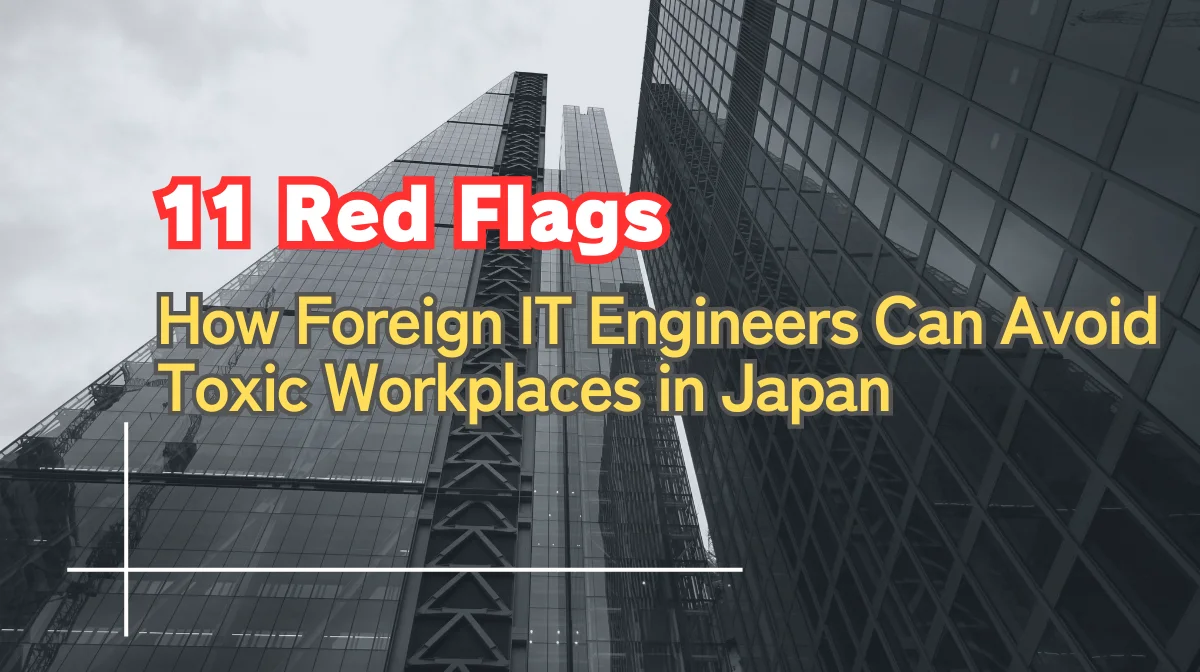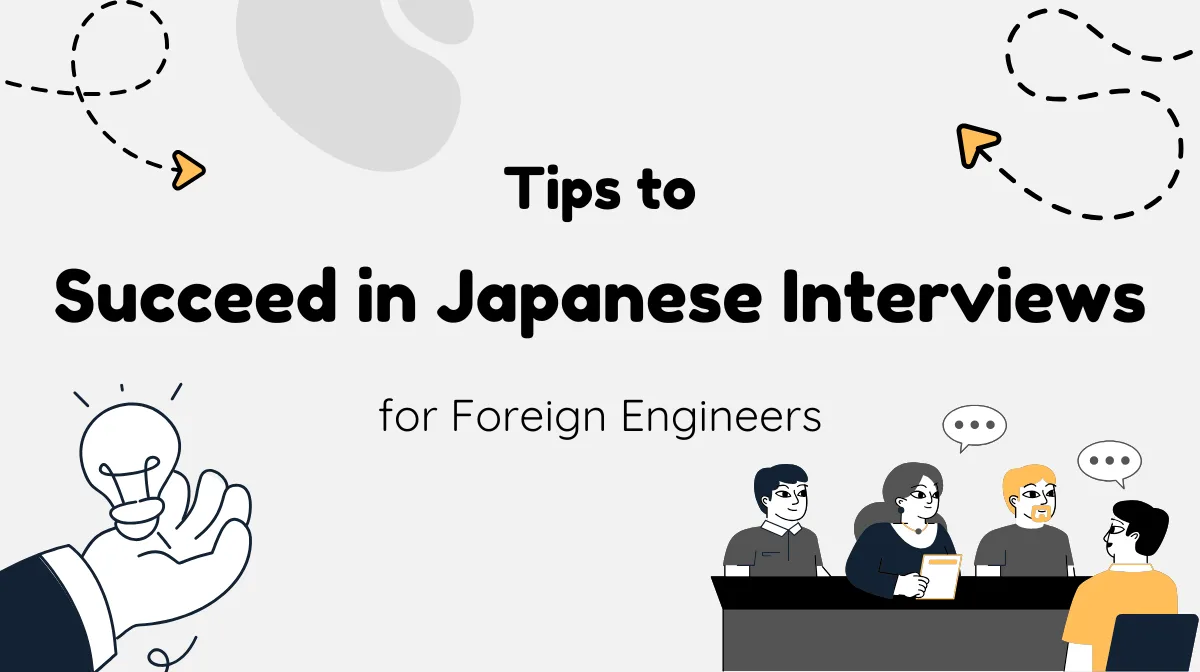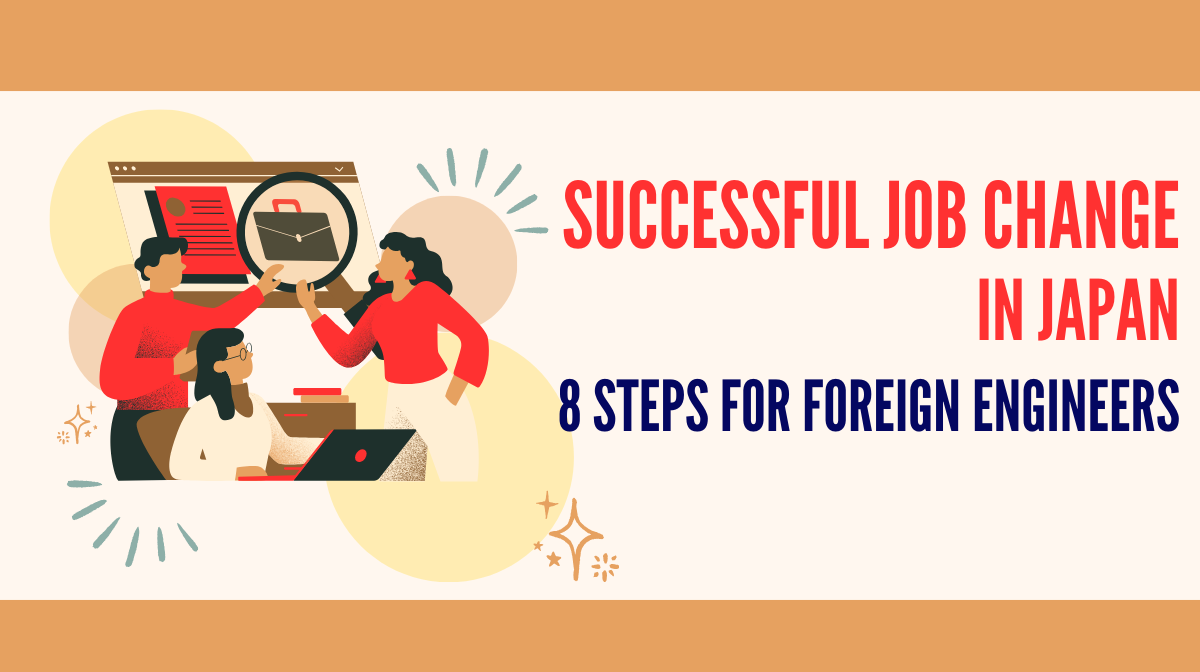Japan’s IT industry is experiencing rapid demand for foreign engineers, but unique challenges exist around visa support and language environments. This guide shows software engineers how to choose the right company through essential checkpoints, red flag identification, and effective research methods.
- Seven checkpoints for choosing the right company
- Red flags to avoid when selecting employers
- Career strategies for each experience level
1. How Software Engineers Choose the Right Company: 7 Essential Checkpoints
Foreign engineers need to evaluate companies beyond standard criteria for long-term success in Japan. These seven checkpoints help you find the right fit.
Visa Support System: Full Support from Application to Renewal
Work visa support is your most critical checkpoint. Top companies handle all procedures, partner with administrative scriveners, and cover application fees.
Key verification points
- Does the company handle all renewal procedures?
- Are costs company-covered?
- Is there support for dependent visas?
- Can they advise on permanent residency pathways?
During interviews, ask: “Will the company support visa renewals?” and “How are costs handled?”
Language Environment: English Communication with Japanese Learning Support
Language environment directly impacts daily work. Ideal companies enable English communication while supporting Japanese development through financial assistance for lessons, dedicated learning time, and translation tools.
Understanding of Diversity: Genuine Acceptance of Foreign Employees
Companies valuing diversity create natural work environments. Look for high foreign employee ratios, multinational teams, and religious considerations (halal food, prayer time, holidays). D&I policies and foreign manager promotions demonstrate serious commitment. Request to speak with current foreign employees during interviews.
Career Advancement: Clear Pathways for Long-term Growth
Verify the company’s track record promoting foreign engineers to leadership and management. Look for global project opportunities, international conference support, and career continuity with your home country. Choose companies investing in your market value through training, qualifications, and external activities.
Comprehensive Life Support: Beyond the Workplace
Strong companies provide comprehensive support: guarantor services, real estate introductions, bank accounts, credit cards, and mobile contracts. For families, verify international school information and education consultations. Medical, health insurance, and tax support are essential.
Work Style Flexibility: Accommodating International Needs
Understanding companies offer flexible hours for time zones, extended leave for home visits, and remote work options. Verify Labor Standards Law compliance, overtime management, and dedicated consultation services. Multilingual contracts indicate genuine consideration.
Technical Growth and Fair Compensation: Global-Level Evaluation
Look for companies investing in latest technologies and collaborating globally. English documentation and communication opportunities are crucial. Evaluate wage parity with Japanese engineers, appropriateness versus your home country, and stock options or global compensation systems.
■Related Reading
Understanding Japanese workplace culture is essential for making informed company choices. Learn the key cultural differences that impact your daily work experience.
2. How Software Engineers Choose the Right Company by Visa Type
Your residency status significantly affects which companies suit you best. Understanding visa-specific considerations helps you make strategic choices.
Engineer/Specialist in Humanities/International Services: The Most Common Work Visa
This general work visa is most commonly held by foreign engineers. Focus on whether job content meets visa requirements and relates to your university major and work history.
Strong companies provide stable 3-5 year renewals, permanent residency consultations, and job transition support. HR department knowledge about these requirements indicates long-term support capability.
Highly Skilled Professional Visa: Maximizing Special Benefits
This points-based visa offers significant advantages: spouse work permission, ability to bring parents, shortened permanent residency periods (1-3 years), and preferential residency up to 5 years.
Choose companies with proven experience accepting highly skilled professionals. They should offer career advancement supporting point increases and present clear plans for salary and position growth.
Specified Skilled Worker/Technical Intern: Planning Your Transition
These visas have transfer restrictions and residency period constraints. Choose companies committed to helping you transition to more stable statuses rather than treating you as short-term labor.
Look for support changing to Engineer/Specialist visas, skill improvement toward Highly Skilled Professional status, and genuine career development. The right company views you as a long-term investment.
Permanent Resident/Long-term Resident: Freedom for Strategic Choices
Without visa restrictions, you can make purely career-focused decisions. This freedom allows targeting management positions, exploring startup support, and ensuring equal treatment with Japanese nationals.
Leverage your stable status to pursue higher-level opportunities including roles with significant decision-making authority.
■Related Reading
Navigate the complexities of Japanese work visas with this comprehensive guide covering visa types, requirements, and application processes for IT engineers.
■日本でエンジニアとしてキャリアアップしたい方へ
海外エンジニア転職支援サービス『 Bloomtech Career 』にご相談ください。「英語OK」「ビザサポートあり」「高年収企業」など、外国人エンジニア向けの求人を多数掲載。専任のキャリアアドバイザーが、あなたのスキル・希望に合った最適な日本企業をご紹介します。
▼簡単・無料!30秒で登録完了!まずはお気軽にご連絡ください!
Bloomtech Careerに無料相談してみる
3. Red Flags: Companies Software Engineers Should Avoid
Identifying problematic companies is as important as finding good ones. Watch for these warning signs.
Inadequate Visa Support
Warning statements and attitudes
- “Please handle visa procedures yourself”
- Requiring personal payment for renewal costs
- Demonstrating basic knowledge gaps about work visas
Concerning track records
- Few past foreign employee hires
- HR department lacking residency status knowledge
- No administrative scrivener partnerships
Excessive requirements
- Demanding unnecessarily high Japanese proficiency for technical work
- Failing to recognize foreign engineers’ unique value
These signals indicate companies unprepared to properly support international employees.
Insufficient Language and Cultural Consideration
Companies lacking cultural awareness create difficult environments. Red flags include Japanese-only work processes, refusing English in technical discussions, and no translation tools.
Watch for cultural prejudice like “You don’t understand because you’re a foreigner” undervaluing foreign opinions, or excessive pressure for drinking parties. Forced assimilation without respecting diversity prevents you from demonstrating true capabilities.
Discriminatory Working Conditions
Avoid companies showing clear wage gaps with equally skilled Japanese engineers, nationality-based discrimination in bonuses and promotions, or contract-reality discrepancies.
Business restrictions like “Important projects are for Japanese only” based on nationality, combined with forced long hours and normalized unpaid overtime, indicate structural problems. Companies disregarding Labor Standards Law won’t provide fair evaluation.
Questionable Stability and Future Prospects
For visa-dependent engineers, company stability is crucial. Warning signs include abnormally high foreign employee turnover, lack of global expansion track record, and lagging technology trends.
Financial instability, questionable business prospects, and bankruptcy possibilities directly threaten your residency status. These structural weaknesses make such companies particularly risky.
■Related Reading
Protect yourself from toxic workplace environments in Japan’s IT industry. Learn to identify red flags and warning signs before accepting a job offer.
4. How Software Engineers Choose the Right Company: Japanese IT Company Types
Japanese IT companies fall into four main categories, each offering distinct advantages and considerations for foreign engineers.
Foreign-Affiliated IT Companies: Most Comfortable Environment
Foreign-affiliated companies like Google, Microsoft, Amazon, and Salesforce typically provide the most comfortable environment. Multinational settings are standard with diversity naturally accepted, English serves as the primary language, and you compete on technical skills without language handicaps.
These companies offer global-level salaries, headquarters transfer opportunities, and established visa support. Cultural adaptation is generally easiest here.
Major Japanese IT Companies: Balancing Stability and Growth
Companies like NTT Data, Fujitsu, and NEC offer stable management with established market positions while increasingly accepting foreign engineers. They provide employment security, large-scale projects, and systematic training supporting long-term development.
Global expansion creates international opportunities, though you’ll need to improve Japanese abilities and adapt to some corporate culture aspects. Many provide robust Japanese learning support.
Rapidly Growing Ventures: Challenge-Friendly Environments
Venture companies like Mercari, Raksul, and SmartNews offer significant discretion with abundant technical challenges, flat communication, and fast decision-making. Growth-driven stock increases and stock options provide potential for substantial returns.
Their diversity-valuing cultures welcome foreign perspectives, though visa support may be more limited. Carefully evaluate future prospects and stability beforehand.
SIers and Contracted Development: Broad Technical Exposure
System integrators and contracted development companies provide exposure to diverse industries and technologies, helping you build broad skill sets. Major SIers offer systematic training, stable projects, and opportunities to learn Japanese business practices.
However, Japanese communication importance increases significantly for client interactions. Some companies risk long working hours, so verify work environments carefully.
■日本でエンジニアとしてキャリアアップしたい方へ
海外エンジニア転職支援サービス『 Bloomtech Career 』にご相談ください。「英語OK」「ビザサポートあり」「高年収企業」など、外国人エンジニア向けの求人を多数掲載。専任のキャリアアドバイザーが、あなたのスキル・希望に合った最適な日本企業をご紹介します。
▼簡単・無料!30秒で登録完了!まずはお気軽にご連絡ください!
Bloomtech Careerに無料相談してみる
5. How Software Engineers Research and Choose the Right Company
Effective research from multiple angles prevents costly mistakes.
Leveraging Specialized Information Sources
Connect with foreign engineers at target companies through LinkedIn for candid opinions about work styles and culture. Check Glassdoor and Indeed for foreign employee evaluations, focusing on Work/Life Balance, Culture & Values, and Diversity & Inclusion.
Engage with foreign communities through JET Program, international exchange associations, and national chambers of commerce for firsthand information. Specialized recruitment agencies provide valuable insider knowledge.
Strategic Interview Questions
Visa-related verification
- Who handles renewal procedures?
- How are costs managed?
- Is family visa support available?
Language environment reality
- What language are technical documents created in?
- What language is used in meetings?
- Are there any English communication issues?
Workplace and career confirmation
- What’s the foreign employee status and retention rate?
- How are religious and cultural considerations implemented?
- Do nationality-based career path restrictions exist?
Response quality and interviewer reactions reveal the company’s true understanding of foreign engineer needs.
Pre-Contract Essential Verifications
Never rely on verbal promises. Request employment contract explanations in your language, ensuring complete understanding of working conditions, salary, and benefits. Clarify every unclear clause.
Confirm specific visa support details, status guarantees during probation, and support continuation upon resignation. Verify maximum and actual overtime hours, paid leave accessibility, and leave system availability. Document everything in writing.
■Related Reading
Master the Japanese interview process with proven strategies. This comprehensive guide covers cultural expectations and preparation techniques for success.
6. How Software Engineers Choose the Right Company: Strategic Career Planning
Long-term success requires phase-appropriate strategies.
Short-term (1-3 years): Foundation Building
Your first years focus on establishing stable life and career foundations. Prioritize visa stabilization, Japanese improvement, and building industry networks over rushing growth.
Choose companies offering full visa support, Japanese learning systems, extensive foreign employee experience, and mentor programs. Focus on adapting technical skills to the Japanese market and preparing for next-stage advancement.
Medium-term (3-7 years): Expertise and Market Value
Years 3-7 emphasize establishing specialized knowledge and gaining team leadership experience. Select companies offering technical growth opportunities, aggressive technology investment, global project participation, and stable compensation.
This phase may include strategic job changes for better conditions. If pursuing permanent residency, begin preparations. Leverage your growing track record for advantageous career moves.
Long-term (7+ years): Leadership and Independence
With substantial Japanese experience, target leadership positions or entrepreneurship. Seek companies offering management paths, business startup support, and roles bridging Japan and global markets.
Aim for strategic decision-making involvement, business network building, mentoring junior engineers, and establishing yourself as an industry leader. Choose companies supporting external activities, valuing international perspectives, and offering flexible career paths.
■Related Reading
Planning a successful job change in Japan requires strategic preparation. Follow this 8-step guide to navigate career transitions effectively and maximize opportunities.
7. Common Questions When Software Engineers Choose Companies

Here are the most frequently asked questions from foreign engineers about company selection and working in Japan, organized by category.
Visa and Legal Procedures
Can I apply without a work visa?
Yes. Many companies support visa acquisition after offers. Clearly state “Visa support required” when applying and confirm support availability.
What happens to my visa when changing jobs?
For the same job type, no visa change is needed, but Immigration Bureau notification is required. Different job types may require visa change applications. Consult your new company in advance.
How long until permanent residency?
Generally 10 years of residence, shortened to 3-5 years for Highly Skilled Professional visa holders. Requirements include continuous employment and proper tax payment.
Language and Communication
Can I work without Japanese?
Yes, at English-main foreign-affiliated companies and some Japanese companies. However, basic Japanese skills broaden career options and advancement potential. Many companies provide learning support.
Are technical interviews in English?
Common at foreign-affiliated and international companies. Even Japanese companies often conduct technical interviews in English, but confirm beforehand.
Worried about meeting culture?
Initial confusion is normal, but many companies increasingly value diversity and accommodate foreign employees. Ask questions actively and confirm unclear points without hesitation.
Salary and Treatment
Will I receive equal salary to Japanese engineers?
Legally yes, though company practices vary. Confirm specific salary system details during interviews.
How do Japanese salaries compare to my home country?
Japan offers mid-level developed country salaries. Consider living costs, social security, and stability comprehensively.
How do bonuses work?
Many Japanese companies pay twice yearly (June and December) based on company performance and individual evaluation. Foreign-affiliated companies often use annual salary systems with different structures. use annual salary systems with different bonus structures.
Career and Growth
Can foreign nationals become managers?
Yes. High technical skills and Japanese communication ability open management paths at many companies. Global companies particularly advance foreign manager promotion.
Will Japanese experience transfer to my home country?
Japan’s internationally respected technical capabilities make Japanese experience highly valued globally. Major company experience especially translates worldwide.
Can I access training and study groups?
Many companies encourage and financially support technical training and external study groups. If concerned about language, propose English-language training or international conference participation.
Life and Culture
Will religious considerations be made?
Diversity-valuing companies often accommodate prayer time, halal food, and religious holidays. Explain your needs during interviews and confirm accommodation possibilities.
Can I bring family?
Work visa holders can apply for dependent visas for spouses and children. Some companies support family visa acquisition as well.
Worried about overtime culture?
Work style reforms have reduced overtime hours in recent years. IT companies increasingly value work-life balance. Ask about actual working hours during interviews.
8. How Software Engineers Choose the Right Company in Japan
Success requires seven essential checkpoints: visa support, bilingual environments, diversity acceptance, career paths, life support, work flexibility, and fair compensation.
Avoid companies lacking visa support, cultural sensitivity, or showing discrimination. Match company types to your visa status and career phase. Use professional networks and thorough research to find your ideal workplace in Japan’s IT industry.

